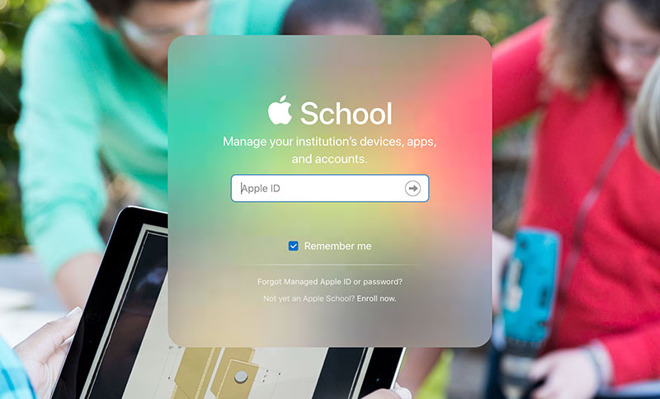Apple now allows developers to distribute custom apps to schools
Apple on Thursday announced an upgrade to Apple School Manager that allows developers to better serve educational institutions through the distribution of customized apps.

Announced in a post to Apple's developer portal, the new feature enables app makers to create and privately distribute custom apps to one or more organizations through the company's Apple School Manager platform. The capability allows developers to fulfill the needs of individual institutions, Apple says.
"You can offer a tailored look and feel, specific functionality for a process or workflow, special configuration for IT environments, security features for company data, and custom features for partners, clients, dealers, franchises, or employees," Apple explains.
Schools can also use the feature to distribute their own apps for internal use.
Once an app is completed, devs are able to authorize downloads by target organizations in App Store Connect. Selected schools are granted access to the app through Apple Business Manger or Apple School Manager and can distribute the software via Mobile Device Management or via redemption code.
Apple notes developers will need to fill out a Paid Applications Agreement if they want to make an app available only to specific organizations. This rule applies to both paid and free apps.
Apple School Manager debuted in beta form in 2016. The website, styled after Apple's business app distribution platform, acts as a central hub for educational administrators tasked with managing large-scale mobile device ecosystems. School Manager provides tools for creating and monitoring Managed Apple IDs, managing MDM enrollment, buying and distributing apps and e-books, building custom courses and more.

Announced in a post to Apple's developer portal, the new feature enables app makers to create and privately distribute custom apps to one or more organizations through the company's Apple School Manager platform. The capability allows developers to fulfill the needs of individual institutions, Apple says.
"You can offer a tailored look and feel, specific functionality for a process or workflow, special configuration for IT environments, security features for company data, and custom features for partners, clients, dealers, franchises, or employees," Apple explains.
Schools can also use the feature to distribute their own apps for internal use.
Once an app is completed, devs are able to authorize downloads by target organizations in App Store Connect. Selected schools are granted access to the app through Apple Business Manger or Apple School Manager and can distribute the software via Mobile Device Management or via redemption code.
Apple notes developers will need to fill out a Paid Applications Agreement if they want to make an app available only to specific organizations. This rule applies to both paid and free apps.
Apple School Manager debuted in beta form in 2016. The website, styled after Apple's business app distribution platform, acts as a central hub for educational administrators tasked with managing large-scale mobile device ecosystems. School Manager provides tools for creating and monitoring Managed Apple IDs, managing MDM enrollment, buying and distributing apps and e-books, building custom courses and more.

Comments
ASM has to do with how Schools and Academic Medical Center and HealthCare companies managed their corporate/school owned fleet of hardware, apps, and books.
The ability for ASM to now allow for custom apps is great, but it's frankly 3 years too late for my company. We have a separate Apple Business Manager account specifically so that we can use and deploy custom apps. For us to switch now would require us to replace the sToken on our MDM which would revoke the licenses for the apps and then reinstall them.
You mean like when I said:
"This is good, but I doubt it is anywhere near enough.
Google is big in schools for the same reason Microsoft is big in business; vendor convenience at the user’s expense. I passed on a Chromebook for my daughter, her iPad runs Google Apps for basic things and iPad Apps for creative things along with MS and Apple software for more advanced presentations.